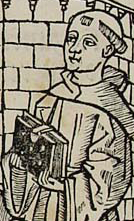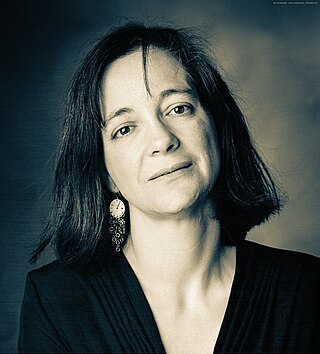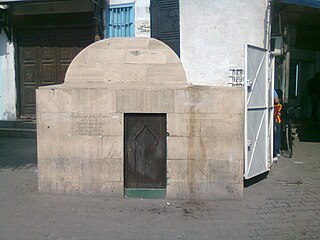Structure

The novel is divided into five parts. [1] Llull's Llibre d'Amic e d'Amat (Book of the Friend and Beloved) is often included as a semiautonomous section within Blanquerna. [2]
Blanquerna is a novel written in Catalan between 1283 and 1285 by Ramon Llull. It chronicles the life of its eponymous hero. It is the first major work of literature written in Balearic Islands.

The novel is divided into five parts. [1] Llull's Llibre d'Amic e d'Amat (Book of the Friend and Beloved) is often included as a semiautonomous section within Blanquerna. [2]
The central character of the novel named after him, Blanquerna, was born to Evast and Aloma. Before marrying, Evast, a nobleman, had wanted to follow a religious life but at the same time wished to experience matrimony. He became a merchant after his marriage to Aloma, and he gives his son an education based on religious and philosophical pursuits.
In the second part of the novel, Blanquerna confronts the same choice his father did: between a celibate life and a married one. Blanquerna decides to become a hermit, which saddens his mother; she tries to have her son marry the beautiful Cana. But Blanquerna persuades Cana to become a nun, and she later becomes an abbess. [3] Blanquerna also faces sexual temptation in the form of a maiden named Natana. This second part includes a description of the seven sins.
In parts three through five of the novel, Blanquerna, having chosen a religious life, becomes a monk (though he desires to become a hermit instead), and quickly becomes an abbot. In time, he is elected pope.
The road to the papacy is not easy; Blanquerna is constantly faced with troublesome decisions and temptations, and he is not perfect. Indeed, Blanquerna "is made credible precisely because he is prone to make mistakes and to experience temptation, and in the end this gives him an authority which other authorities are obliged to recognize." [4] Blanquerna's life takes him through widely varying places and social strata, from uninhabited forests and wildernesses to the dense Roman urban landscape of thieves and prostitutes, from interactions with young maidens to interactions with popes and emperors. [4]
As he matures, Blanquerna listens to the advice of a jongleur, a "wise fool" named Ramon. Blanquerna reforms the Church completely as pope, with Ramon’s help, and finally becomes the hermit he had always desired to be. As a hermit, he composes a book of meditations to help his fellow hermits defeat temptation: this is the Llibre d'Amic e d'Amat, which consists of 365 love poems. [1] This text "purports to offer the protagonist’s mystical confessions, based on personal experience and examples of 'Sufi preachers,' as a guide to contemplation within the apostolic utopia of a reform of contemporary Christendom." [2]
27 The bird was singing in the garden of the Beloved. The Lover came and said to the bird: - If we don’t understand each other through language, let’s communicate through love, because your song represents my Beloved to my eyes.
295 The Lover was in danger in the great sea of love; and he trusted his Beloved, who came to rescue him with tribulations, thoughts, tears and cries, sighs and sorrows, since the sea was one of love and also made to honour his principles.

Ramon Llull, anglicised as Raymond Lully or Lull, was a philosopher, theologian, poet, missionary, Christian apologist and former knight from the Kingdom of Majorca.

Catalan literature is the name conventionally used to refer to literature written in the Catalan language. The focus of this article is not just the literature of Catalonia, but literature written in Catalan from anywhere, so that it includes writers from Andorra, the Valencian Community, Balearic Islands and other territories where any Catalan variant is spoken.

Nicholas Eymerich was a Roman Catholic theologian in Medieval Catalonia and Inquisitor General of the Inquisition in the Crown of Aragon in the later half of the 14th century. He is best known for authoring the Directorium Inquisitorum, that mostly summarized previous texts and mores.

Francesc Eiximenis was a Franciscan Catalan writer who lived in the 14th-century Crown of Aragon. He was possibly one of the more successful medieval Catalan writers since his works were widely read, copied, published and translated. Therefore, it can be said that both in the literary and in the political sphere he had a lot of influence. Among his readers were numbered important people of his time, such as the kings of the Crown of Aragon Peter IV, John I and Martin I, the queen Maria de Luna, and the Pope of Avignon Benedict XIII.

Francesc Pujols i Morgades was a Catalan writer and philosopher.

Maria Mercè Marçal i Serra was a Catalan poet, professor, writer and translator from Spain.

Anselm Turmeda, later known as Abd Allah at-Tarjuman, was a Christian priest from Mallorca who converted to Islam and settled in Tunis. He is one of the earliest writers to have written in both Arabic and a Latin language (Catalan). He became a vizier in Hafsid Tunis where he died in 1423 during the reign of Abu Faris Abd al-Aziz II.

Najat El Hachmi is a Moroccan-Spanish writer based in Catalonia. She holds a degree in Arabic Studies from the University of Barcelona. She is the author of a personal essay on her bicultural identity, and three previous novels, the first of which earned her the 2008 Ramon Llull Prize, the 2009 Prix Ulysse, and was a finalist for the 2009 Prix Méditerranée Étranger.

Baltasar Porcel i Pujol was a Spanish writer, journalist and literary critic. His enormous legacy credited him as one of the greatest authors in Catalan literature from the 20th century.
Curt Wittlin was a Swiss philologist and an expert of medieval Catalan language and literature.
Beloved/Friend is a 1999 film directed by Ventura Pons based on a book by Josep Maria Benet i Jornet, Testament.

Albert Manent i Segimon was a Catalan writer and cultural activist. He was mostly involved in the field of Catalan. Manent was the son of the writer Marià Manent. He graduated the subject of law and in Catalan philology. He was born in Premia de Dalt, Spain.

Vicenç Pagès i Jordà was a Catalan writer and literary critic. He was also a language and aesthetics professor at the Ramon Llull University. He published a dozen books, including novels, story collections, and essays. Among his many awards are the 1999 Documenta, the 2003 Sant Joan, the 2009 Crexells, the 2013 sant Jordi, and the 2014 Catalan National Cultural Prize.

Ramon Gener Sala, known simply as Ramon Gener, is a Spanish musician, pianist, humanist and writer. A BA in Humanities and Business Sciences, he also studied piano and singing. After some years working as a baritone he left the profession and started his new stage as a lecturer and musical communicator. In 2011 he became the host of the television program Òpera en Texans. Later he directed and hosted This is Opera (2015), This is Art and 200; una noche en el Prado (2019).
Jaume Medina i Casanovas was a Catalan philologist, latinist, writer, translator and poet.
The Ramon Llull Novel Award is an honor given annually to a novel originally written in Catalan. Conceived in 1981 by editor José Manuel Lara Hernández, it is awarded by the Planeta publishing house in conjunction with the Government of Andorra. It confers a monetary prize, originally 250,000 pesetas and now €60,000. It recognizes works of the greatest economic value in the Catalan language.
The Book of the Gentile and the Three Wise Men is an apologetic by Ramon Llull. It was first written in Arabic, then in Catalan and Latin.

Kálmán Faluba is a Hungarian philologist whose work has helped to make the Catalan language more well known in his country.

Miquel de Palol i Muntanyola is a Catalan architect, poet and storyteller, son of the archaeologist Pere de Palol.

Núria Pradas i Andreu is a Spanish Catalan philologist and writer. She began her literary career in the field of children's and youth literature. She is the author of an extensive literary production in this field as well as in adult fiction.